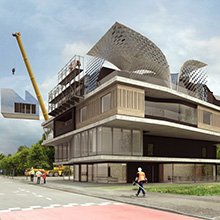Department Process Engineering
Let’s collaborate on developing technologies for resource-oriented sanitation
![[Translate to English:] Zooey Braun, Stuttgart](/fileadmin/_processed_/f/1/csm_NEST_eastside_UMAR_night_Photo_Zooey_Braun__Stuttgart_6ba22d9f69.jpg)
Together with experts in the field, the Water Hub at NEST on the Eawag/Empa Campus provides a platform for research on decentralized resource-oriented sanitation and the development of innovative sanitation technologies. Do you want to explore a new concept or technology in our living laboratory and run tests under representative conditions?
The Water Hub can provide seed funding for small applied and explorative projects that link research, industry and/or practice in the field of resource-oriented sanitation. Projects can range from conceptual matters, to design and implementation, to building-scale technologies to individual technology parts (e.g., sensors or membranes). With the offered seed funding we hope to enable the (quick) testing of new ideas and kick-start technology development.
Have we sparked your interest? Would you like to collaborate with Eawag researchers to explore innovations that facilitate future resource-oriented sanitation? Please contact us! We are excited to hear your ideas and to explore potential collaborations. For more information on the Water Hub, visit our project website.
How to submit your proposal
Eligibility
To be eligible for seed funding, a project must have:
- at least one Water Hub researcher as a partner;
- a short project duration (up to 6 months);
- no other suitable funding scheme available (whether at Eawag or externally);
- economic commitment on the side of the external project partners (in money and/or in kind):
- Startups/small companies: 10% of total budget;
- SMEs: 20-30% of total budget;
- large companies: 50% of the total budget;
- seed funding from the Water Hub cannot exceed 50k CHF per project.
Deadlines
There is no deadline for proposal submissions; rather the Water Hub evaluates proposals on a rolling basis.
Procedure
- Contact the coordination team to discuss ideas and expectations.
- Rosanne Wielemaker: rosanne.wielemaker@eawag.ch , +41 58 765 67 15
- Giuseppe Congiu: giuseppe.congiu@eawag.ch , +41 58 765 57 71
- The coordinators will discuss your proposal with the Water Hub team and collect their feedback. If one or more researchers are interested, the coordinators will support you in creating a project proposal and outline for submission.
- After the proposal submission, you will receive prompt feedback and information on the next steps.
Concluded and ongoing projects
The following projects were, or are currently, financed with Water Hub seed funding:
Sensors Evaluation for Blackwater solid/liquid separation with Endress + Hauser (Concluded)
Small-scale blackwater treatment systems in dense urban areas need to handle high variety in blackwater characteristics. Thus, real-time monitoring is necessary to ensure robust and efficient treatment in a small footprint. Within a Water Hub collaboration, the Eawag MEWS group of the Department Sanitation, Water and Solid Waste for Development (Sandec), worked together with Endress+Hauser Group to compare the ability of five state-of-the-art sensors to measure and predict solids content in variable blackwater, and to then automate flocculant dosage for off-grid treatment of blackwater. Results indicate that optical measurements, as well as microwave or Coriolis-flow measurements reliably predict solids content. However, when additional components such as salt (from high urine content) or oil (from kitchen waste) were added, only optical measurements performed reliably. These results led to two follow-up projects. Optical sensors were tested on a small pilot dewatering unit for stored blackwater in Lebanon and optical sensors will be installed in the new dewatering unit in the Water Hub at NEST.
Development of an automated blackwater treatment unit (Ongoing)
The on-site treatment of blackwater offers various challenges: complex composition, high organic load, heterogenous constitution and temporally variable load quantities and characteristics. Together, the MEWS Group from the Department Sanitation, Water and Solid Waste for Development (Sandec) and David Hasler from the Department of Process Engineering (ENG), are working to make substantial progress in the development of a technology for automated and reliable on-site blackwater treatment for situations where feces have been mixed with water (for example via flush toilets). The goal is the development of a prototype for the conditioning and mechanical separation of the liquid and solid fractions in blackwater. After implementation in the Water Hub, the plan is to transfer the developed technology into a non-sewered, densely-populated urban setting.
NoMix Circular Installation with Cerca Design Studio (Ongoing)
Resource-oriented sanitation requires the installation of parallel piping for the separate water streams (e.g. drinking water, rainwater, greywater, blackwater, urine). The space requirements, hydraulics and pneumatics of those streams differ from today's standard sanitary installations. The planning of such parallel piping systems, as well as their seamless installation in the construction process, are complex and must avoid incorrect connections. Therefore, Cerca Research & Design Lab is working in close collaboration with Moser's Büro (MoBü) and the Water Hub to understand the challenges of parallel piping for future domestic water management. The goal is to identify potential solutions that render separated water piping simple and understandable: robust process stability for circular sanitary installations. These solutions will be developed and tested in collaboration with industrial partners to determine best-practice approaches that can establish safe and easy source-separated plumbing.





